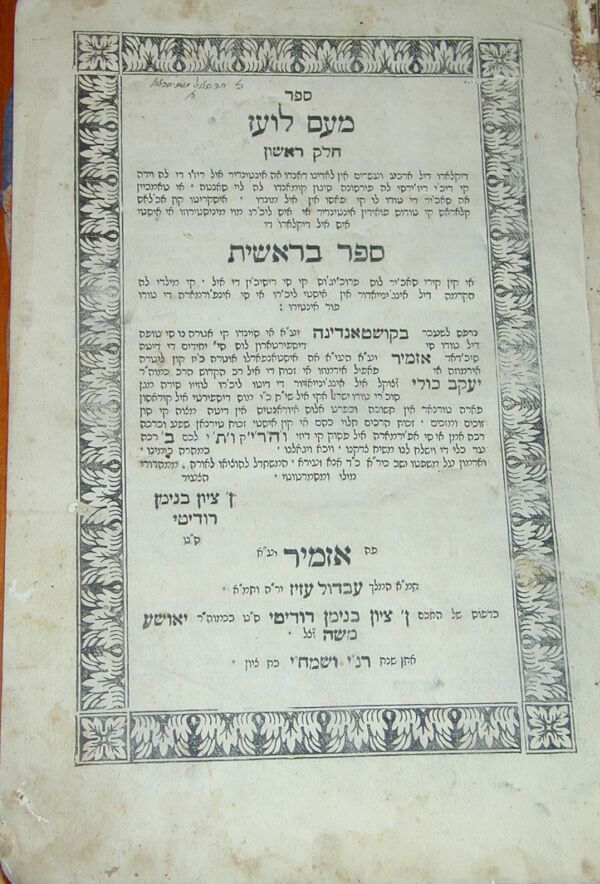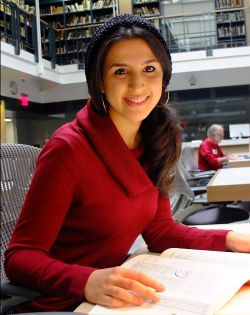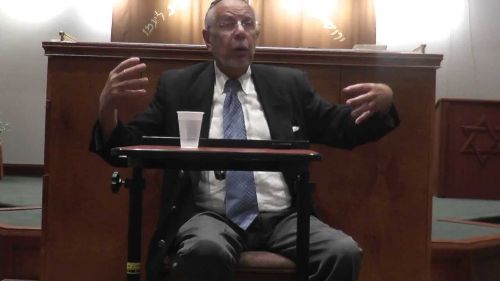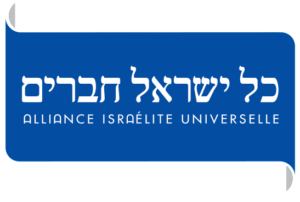A Sephardic Sage’s Re-Articulation of Judaism as Maimonidean Humanism

In Honor of Carlos Benaim, ISEF Chairman, Distinguished ASF Board Member, world-renowned perfumer, and native of Tangier, Morocco, who inspires us all to love the Sephardic tradition and community!
~Joshua Benaim, leader of the ASF Sephardi House’s revival
Click here to dedicate a future issue in honor or memory of a loved one.

The Monthly Sage ◊ Feature ◊ Sephardi Gifts ◊ Upcoming Events ◊ Donate ◊ Archive
Sephardi Ideas Monthly is a continuing series of essays and interviews from the rich, multi-dimensional world of Sephardi thought that is delivered to your inbox every month.
This month’s issue of Sephardi Ideas Monthly explores the life and career of Hakham José Faur (1934-2020), the scholarly titan and perpetual intellectual rebel who passed away on 9 June in Israel. Faur’s intellectual excellence went largely unrecognized in the Jewish world, and it’s fair to assume that many of our readers are relatively unfamiliar with this remarkable figure. So, who was José Faur?
It’s helpful to begin the sage’s self-portrait from the José Faur Tora Studies Center, a self-portrait remarkable both for its self-confidence and the educational ambition that it projects:
Professor of Talmud, rabbi, and dayyan (judge), the Hakham José Faur has worked hard to educate Jews and non-Jews alike about rabbinic Judaism and the Talmudic tradition. Promoting Judaism as the essence of religious humanism, Faur has initiated a vast project of ‘re-articulating’ Judaism in terms that are directly accessible to contemporary minds. Emphasizing the role played by the Sefaradi cultural and intellectual tradition in successfully continuing the Maimonidean legacy, Faur has especially sought to reacquaint Sefaradim – and the world – with the essence of their heritage.
Contemporary academics are usually allergic to “essences,” and contemporary religious scholars are usually allergic to broadly human concerns. Like classic Sephardi Judaism, however, Faur didn’t fit into any contemporary conventions. But even as his self-description hints at the self-assurance and the vastness of Faur’s perspective—“Promoting Judaism as the essence of religious humanism… (reacquainting) Sefaradim—and the world—with the essence of their heritage…”—it still barely touches the tip of the iceberg. Faur’s spiritual-intellectual journey was truly mind-bending.
“The Torah of Hakham José Faur”

Born into and educated by the Shami (Damascene) Syrian Sephardic Jewish community of Buenos Aires, Faur’s early career included a few years with the black-hatted Haredi Yeshiva world of Lakewood, New Jersey. There, Faur (whose mastery of languages included German) learned with the Yiddish-speaking gadol (giant) of Haredi Lithuanian Judaism, Rabbi Aharon Kotler. Faur’s next step was to enroll at the University of Barcelona, where he earned a B.A. in Semitic Philology and an M.A. in Semitic Languages. Meanwhile, he received rabbinic ordination from Hakham Suleiman Haggai Abadi, head of the Rabbinical High Court of Jerusalem.
After completing a doctorate in Semitic Languages in 1964, Faur returned to the United States and began teaching in Brooklyn, even as he enrolled at a Jewish Theological Seminary (JTS) post-doctoral program directed by its legendary professor of Talmud, Saul Lieberman. Faur accepted a position at JTS in 1967, but subsequently resigned in 1985 when the Graduate Rabbinical School began admitting women. In 1987, he took a position as Visiting Professor at the Spertus Institute for Jewish Learning and Leadership in Chicago, where he taught until 1993. In the meantime, beginning in the 1960’s Faur suffered through a series of controversies within the Syrian Jewish community that revolved around his alleged intellectual-spiritual heresies, controversies that ultimately involved some of Israel’s leading Sephardi figures and the country’s Hebrew-language Haredi press.
Faur ultimately moved to Israel, where he taught at Bar Ilan University and Netanya Academic College. Over the course of his career, Faur composed nine books and scores of scholarly articles that were notable both for their prodigious erudition and independent intellectual-spiritual spirit.
How is one to make sense out of such a varied and extraordinary career? That’s too much of a task for a single article or essay, but a good place to start is Dr. Mijal Bitton’s fascinating article, “The Torah of Hakham José Faur.” Mijal Bitton, Fellow in Residence at the Shalom Hartman Institute of North America, the communal leader and co-founder of the Downtown Minyan in New York City, and a 2018 American Sephardi Federation Broome & Allen Fellow was selected the same year for inclusion in the New York Jewish Week’s ’36 under 36’. Aside from earning her doctorate from New York University, Bitton also happens to be Faur’s great-niece.
Stated plainly, Faur believed that the entire Jewish religious world had fallen away from “the Maimonidean legacy” of “religious humanism” mentioned in his self-description above. For Faur, that Maimonidean humanism constitutes the heart of Judaism, and Bitton’s essay accordingly explores her great uncle’s “polemical project against so much of… mainstream Jewish tradition.” The polemical character of that project also “helps explain the brunt of the antagonism against Hakham Faur.” Interpretive key in hand, Bitton skillfully traces the ways in which Faur’s “attempt to revive Old Sepharad” linked up with some unexpectedly contemporary academic fellow-travelers while serving as a source for both scholarly creativity and communal controversy throughout his career.
Sephardi Ideas Monthly is honored to celebrate José Faur’s memory with Mijal Bitton’s stimulating, fascinating, and enlightening essay, “The Torah of Hakham José Faur.”
~~~~~~~
 |
| All Jews Together @ ASF’s Institute of Jewish Experience“We have to unite our energies together. All Jews, together…. If we are united, all Sephardim and also Ashkenazim, together… we will see the light!” ~Enrico Macias The ASF Institute of Jewish Experience is uniquely dedicated to ensuring that today’s Jews know our history; appreciate the beauty, depth, diversity, and vitality of the Jewish experience; and have a sense of pride in Jewish contributions to civilization. Donate Now! |
~~~~~~~
Feature: Hakham Faur on Rosh HaShana, Yom Kippur, & Responsibility

(Screenshot courtesy of YouTube)
In this 2013 lecture for United Mashadi Jewish Community of America’s Mashadi Youth Committee (MYC), Hakham Faur gives his thoughts on the upcoming holidays.
~~~~~~~

The Monthly Sage החכם החודשי

(Photo courtesy of Wikipedia)
The sage for the month of August is Hakham Yaakov Kuli (1685-1732).
Born in Jerusalem in 1685, Yaakov Kuli moved to Safed, where he studied with the local sages and copied the writings of his illustrious grandfather, the Rishon LeZion, Hakham Moshe Ben Haviv.
In 1714, Hakham Yaakov Kuli traveled to Istanbul (then, Constantinople) to publish his grandfather’s books. The local Hakham, Judah Rosanes, noted Kuli’s stature as a scholar and appointed him dayyan (judge) in the local Rabbinic Court. After Rosanes’ passing, Kuli published his writings, as well, including his, Mishneh la’Melekh, one of the most famous commentaries on Maimonides’ Mishneh Torah.
Now established as a scholar, Kuli also began publishing his own writings. Most famously, Kuli published his Ladino-language classic, Me’am Lo’ez. The book, which included Kuli’s commentaries on Genesis and Exodus (his students completed the rest), integrated straightforward commentary on the text with more expansive Midrash, summarized the Halakhic rulings that preceded his, and placed a special emphasis on societal mitzvot.
Hakham Yaakov Kuli passed away on 19 Av 5492 (1732)
The following passage from Me’am Lo’ez beautifully illustrates Hakham Kuli’s emphasis on the social dimension of observant life, as he teaches about the commandment to sweep and clean the house of a sick person:
“… while you, who held fast to the LORD your God, are all alive today.” One cannot, of course, hold fast to the Shechina; the verse’s meaning is that we adhere to His commandments, fulfill His commandments and learn from the light and goodness of His ways. Thus, we find that the Holy One, blessed be He, visited the sick Himself, as we see when He came to visit our father Abraham. From this we learn that great people must also visit less important people, and that stringency about rank is not pertinent to fulfilling commandments. This is particularly so in the case of this commandment, in that the heart rises at the sight of another’s distress; when one asks for compassion and the prayers are accepted it as though one had revived the ill person. And upon the sight of such distress, one seeks out those things that are necessary, and is obligated to sweep and clean their house, for a place full of litter causes an illness to become worse, as does sleeping in a filthy and dusty place. Whoever cleans does an act of great loving kindness. And one who visits the sick yet does not pray for their recovery has not fulfilled the commandment. Happy are those who treat the poor when they are ill, and make efforts to visit the sick, and have people who inform them about who might be ill so that they may send flower nectar, fowl and all they might need…
Me’Am Lo’ez, Genesis Chapter 1, p. 345, New Edition, 1967
Upcoming Events or Opportunities:
| The ASF Institute of Jewish Experience and Kol Yisrael Haverim (Alliance Israélite Universelle – KIAH) present: Teaching the Jewish Experience Mosaic – Egypt Wednesday, 19 August from 12:00-3:15PM EDT Zoom workshops with educators from across the globe Sign-up Now!  We are excited to launch a new initiative: T-JEM: Teaching the Jewish Experience Mosaic Kol Yisrael Haverim (Alliance Israélite Universelle – KIAH) and ASF Institute of Jewish Experience have joined forces to offer a series of teacher workshops. Each workshop will present the Jewish dialectic as embodied in a different Jewish community’s culture, literature, philosophy, history, geography, and Rabbinic sources. This first session, on Egyptian Jews, will be held on Wednesday August 19 from 12:00-3:15 pm EDT for a select group of educators. A tentative schedule for the workshop is as follows: Virtual Diarna Geo-Museum tour of Egypt and its Jewish sites IJE teaching resources for Egyptian synagogues Panel discussion – Multifaceted aspects of Jewish thought – Egypt as a case study, with Prof. Zvi Zohar and others KIAH Hakham Yomi as the basis for lessons – small group discussion Applications and next steps “The Torah scroll has no vowel symbols (nikkud) so that people may interpret as they wish. The letters, not being marked with vowels, tolerate different meanings, and can break up into many sparks. This is why we were instructed not to punctuate Torah scrolls with vowels.” – Hakham R’Haim Yosef David Azoulai If you have any questions or to register please reach out to drora@americansephardi.org |
Sephardic Culinary History with Chef Hélène Jawhara-Piñer Episode One: Eggplant Almodrote and Moroccan Flatbreads Sephardi Culinary History is a new show that combines chef and scholar Hélène Jawhara-Piñer’s fascination with food studies and flair for creating delicious cuisine. Join along as she cooks Sephardic history! Sunday, 30 August at 10:00AM EDT Sign-up Now! Tickets support Chef Hélène’s forthcoming publications and the ASF’s Institute of Jewish Experience ASF Broome & Allen Fellow Hélène Jawhara-Piñer earned her Ph.D in History, Medieval History, and the History of Food from the University of Tours, France. Chef Hélène’s primary research interest is the medieval culinary history of Spain through interculturality with a special focus on the Sephardic culinary heritage written in Arabic. A member of the IEHCA (Institute of European History and Cultures of Food), the CESR (Centre for Advanced Studies in the Renaissance), and the CoReMa Project (Cooking Recipes of the Middle Ages), Chef Hélène has lectured at Bar-Ilan University (in collaboration with the Stali Institute and the Spanish National Research Council (CSIC): “El patrimonio culinario judío de la Península Ibérica a través de un manuscrito del siglo XIII. Ejemplos de la pervivencia de recetas en la cocina de los sefardíes de España y de Marruecos,” 2018), as well as at conference of the Association Diwan (“Reflections on the Jewish heritage according to the Kitāb al-ṭabīẖ,” 2015), IEHCA of Tours (“Jews and Muslims at the Table: Between coexistence and differentiation: state of affairs and reflections on the culinary practices of Jews and Muslims in the Iberian Peninsula and in Sicily from the 12th to the 15th century,” 2017), and Society for Crypto-Judaic Studies (“The hidden Jewish culinary heritage of the Iberian Peninsula through a manuscript of the 13th century. Examples of the provenance of some recipes in Venezuelan and Colombian cuisine,” 2017). In May, Chef Hélène hosted “Shavuot in the Sephardic Kitchen: Bread of the Seven Heavens,” one of the most popular sessions of the Great Big Jewish Food Fest. Her recipes have appeared in the Sephardi World Weekly, Tablet Magazine, The Forward, and S&P Central’s Newsletter. Chef Hélène is currently writing a scholarly book and accompanying cookbook on the Jewish culinary history of Spain. We are proud Chef Hélène is serving as one of the judges for the ASF’s Great Sephardic Chef Competition! Sponsorship and Naming opportunities avaialble: info@americansephardi.org |
The ASF’s Great Sephardic Chef Competition Enter for a chance to win a spot in the ASF’s Virtual Cookbook and other prizes! Does your family have the best Sephardic recipe? Like to cook Sephardic? Let the world know by submitting your recipe to the ASF’s Great Sephardic Chef Competition. Entries will be judged by a panel of scholars, chefs, restaurateurs, and authors in the following categories: Appetizers Bread Communities (Greek, Iraqi, Italian, Moroccan, Persian, Spanish, Syrian, et al…) Desserts Entrees Grandma’s Favorite Mom’s Best Salads Shabbat Soups Special Occasions & Creations Vegan Yom Tov Submission Due Date: 15 October 2020 $10 per entry; unlimited entries! Submit Your Video Here! Finalists will be announced on 17 December 2020 by our international panel of judges! Sponsorship and Naming opportunities avaialble: info@americansephardi.org |
 The ASF Institute of Jewish Experience presents: The Greek Experience Explore the world of Greek Jewry from the ancient Romaniote to the Sephardim and others who made it to and through Greece. An online course presented in 10 minute episodes. Learn at your own pace. Please sign-up now! Total cost of the course is $75.00 Jews have been in Greece since before the Temple was destroyed. They were in Greece upon the founding of the Greek Orthodox Church. Community members, known as Romaniote, made their way through Venice, Byzantium, Spain, across the Ottoman Empire, and beyond. Dr. Yitzchak Kerem provides an overview of the unique languages, liturgical nuances, and communal life of Jews across Greece. Dr Kerem spent significant time living in Greece and researching Greek and Sephardic history. Photographs, maps, and personal accounts provide course participants with a full picture of the unique nature of the Jews of Greece and its surroundings. In the course, participants will look at major influential points in Greek Jewish history. They will explore The Golden Age of Salonika, a time when Greece’s northern city was a hub of Jewish scholarship. Kerem introduces the tension arising in the Greek Jewish community because of Shabtai Tzvi and the Sabbateanism movement that brought with it false messianism and conversion to Islam, at least outwardly. The course looks at when the Alliance Israélite Universelle moved in and the Sephardic culture in Greece developed a rich secular culture with its own novels, theater, and music. This is part of the greater Jewish heritage and history that is often overlooked. ASF IJE online courses will bring to life all parts of the greater Jewish Experience. For more information and other ASF IJE online course offerings visit: https://courses.instituteofjewishexperience.org/ |
 The ASF Institute of Jewish Experience presents: The Crypto Experience The Global History of Secret Jews An online course presented in 10 minute episodes. Learn at your own pace. Please sign-up now! Total cost of the course is $75.00 The ASF Institute of Jewish Experience is proud to present “The Crypto Experience,” an online course on Crypto-Jews. It is part of a series of online courses on a variety of topics that make up the robust Jewish experience. For hundreds of years there have been descendants of Crpto-Jews, who have covertly kept some of their traditions while maintaining a very different public persona. It is a question of identity, be it Huegenot, Catholic, Sephardi, or Mashadi. Professing one faith on the outside and another on the inside speaks to our quest for defining identity today. These questions of identity that we think are so new and so relevant are really rather old questions under different circumstances. In this course Dr. Hilda Nissimi (Bar Ilan University) presents an overview of crypto societies historically and in the context of today. She challenges the participants to ask themselves difficult questions like: What defines identity? If I project this outer self, how do I keep my real me? Who is the real me? Am I the me before the expression of an outer facade? Is it a new me? The course discusses these questions as they pertain to Jews, specifically. What does it mean to be a Jew? What do I have to keep if I want to call myself a Jew? Am I allowed to change? Am I the person to decide? Who will decide? How can anyone decide under such circumstances? In order to understand this in historic and cultural contexts, world-renowned scholars and experts in the field have joined Dr. Nissimi and will be presenting the challenges facing a range of crypto societies: Huegenots – Dr. Hilda Nissimi Spanish-Portuguese Crypto Society – Dr. Ronnie Perelis (Yeshiva University) Bildi’in of Morocco – Professor Paul Fenton (Sorbonne Université, Paris) Mashhadi Jews of Iran – Dr. Hilda Nissimi Tracing Jewish Roots – Genie and Michael Milgrom Growing Up Mashhadi– Reuben Ebrahimoff For more information and other ASF IJE online course offerings visit: https://courses.instituteofjewishexperience.org/ |
| Donate nowand your generous tax-deductible contribution will empower the ASF to fight for Jewish unity and champion the Sephardi voice in Jewish communal affairs at home and abroad, as well as in our programs, publications, and projects. Contact us by email to learn about giving opportunities in honor or memory of loved ones |